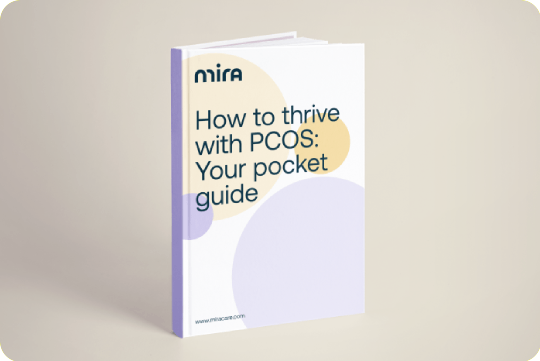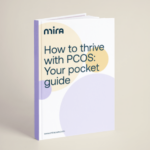How to Get Pregnant with PCOS: 11 Tips to Get Pregnant Fast
Polycystic ovarian syndrome (PCOS) is a hormonal disorder affecting more than 5 million women globally. It is also one of the most common causes of fertility issues. However, there are several ways you can get pregnant with PCOS, with or without treatment. Most women with PCOS can conceive with a combination of lifestyle changes and fertility treatment options, and a few rare cases may require in-vitro fertilization (IVF).

Can You Get Pregnant with PCOS?
Yes. You can still get pregnant if you have PCOS. With the help of certain lifestyle changes and medications, PCOS is treatable and pregnancy is possible.
What Is PCOS?
Polycystic ovarian syndrome, or PCOS for short, is a hormonal health condition affecting women’s fertility. It is caused by a particular kind of hormonal imbalance, which can make it difficult to ovulate.
What common symptoms are associated with PCOS?
The most common symptoms of PCOS include:
- Irregular or absent periods
- Excessive body and facial hair
- Acne
- Hair loss
- Difficulties with getting pregnant
- Insulin resistance
- Weight gain
- Heavy periods
Other symptoms of PCOS include thinning hair, darkening of the skin, and the development of skin tags in the neck area or armpits.
How to Get Pregnant with PCOS
Lifestyle Changes
Losing Weight
Obesity affects as many as half of PCOS patients. If you are overweight, like many women diagnosed with PCOS, you may want to consider losing weight to restart ovulation.
The symptoms of PCOS include problems responding to insulin, which is called insulin resistance. Insulin is typically secreted to respond to increased levels of glucose when we eat, which is a small sugar molecule found in many carbohydrates. Insulin allows cells to uptake glucose so they can store it as energy for later use.
Insulin resistance doesn’t allow the body to respond to insulin well, which results in high blood sugar and low energy. Over time, it may cause weight gain and even obesity.
One major reason that women with PCOS have a hard time conceiving is that they don’t ovulate, or don’t ovulate regularly. Studies show that obese women are more likely to experience anovulatory infertility, or infertility due to a lack of ovulation. Without ovulating regularly, a woman cannot get pregnant.
Weight loss works for PCOS because it reduces the number of circulating androgens and increases insulin sensitivity. A large number of research studies have shown that reducing weight by 5-10% can reduce insulin resistance by about 50%, restore ovulation, and regulate menstrual cycles.
Healthy Diet and Exercise
A balanced lifestyle is always important for pregnancy, but especially if you struggle with PCOS.
Maintaining a healthy diet and exercising regularly can help women with PCOS maintain a normal weight and increase insulin sensitivity.
There is some debate about what type of diet is best for women with PCOS. Some believe a low-carb diet may help, while others disagree. However, what’s most important is that you eat an overall balanced diet rich in whole foods, with plenty of fruits and vegetables, fiber, and adequate protein. Though you should still treat yourself sometimes, of course, it’s also a good idea to avoid added sugar as much as possible.
Regular exercise has also been found to be helpful for PCOS patients. One study found that exercise therapy restored regular periods in 60% of PCOS patients.
Small changes can make a big difference. Over time, shifting towards a healthier lifestyle benefits ovulation regularity and the success rate of fertility treatment (more on how PCOS might impact ovulation testing here).
Birth Control Pills
Birth control pills contain synthetic forms of the female sex hormones estrogen and progesterone. These hormones can reduce androgens, regulate cycles, and help correct hormone imbalance in patients with PCOS.
Birth control pills are a common treatment option for women with PCOS, but because they prevent pregnancy, they are not appropriate for women who are trying to conceive.
Monitor Blood Sugar
PCOS causes insulin resistance, which results in high blood glucose levels — a.k.a. high blood sugar. Having insulin resistance and high blood sugar increases your risk of developing type II diabetes, especially if you are overweight or obese. In fact, one study found that 19% of women with PCOS developed type II diabetes, compared with just 1% of the control subjects.
Women with PCOS can benefit from monitoring their blood sugar, especially if they have type II diabetes or prediabetes. If you do not have diabetes, you will need to visit your doctor for a blood glucose test. Together, you can decide how often to repeat the test to keep an eye on your blood sugar levels and monitor your risk of developing type II diabetes. Women with type II diabetes need to monitor their blood sugar more regularly at home to ensure they are staying within a healthy range.
In between monitoring your blood sugar, you can also take steps to maintain regular blood sugar levels throughout the day. You can do this by limiting your intake of carbohydrates and starchy vegetables, getting enough protein, and drinking plenty of water. It may also help you to eat many small meals throughout the day, as opposed to three large ones at breakfast, lunch, and dinner. However, this is not recommended if you are insulin resistant or if you have prediabetes or diabetes.
Medications
Metformin
Metformin is a drug that is usually prescribed for type II diabetes. However, it is often used “off-label” to manage PCOS.
The drug works by treating the insulin resistance associated with PCOS. It makes the body more sensitive to insulin and lowers blood glucose levels. In addition to improving insulin sensitivity, the drug may reduce circulating levels of androgens in women with PCOS.
Due to these effects, studies show that metformin is effective at inducing ovulation in women with PCOS. In fact, an Italian study even found that the drug was significantly more effective than Clomid, a common fertility drug, in restarting ovulation.
Letrozole
Letrozole is a cancer drug that is often used to treat PCOS. Don’t be scared of the fact that it was originally developed to treat cancer: its side effects are rather mild, and the drug has been widely used in infertility treatment for women.
Letrozole suppresses the production of estrogen. Lowered levels of estrogen induce the pituitary gland to produce more follicle-stimulating hormone (FSH), which promotes the growth of follicles within the ovary to induce ovulation. Mira can be useful for better understanding how your hormones relate to your PCOS.
Some studies show that letrozole may be more effective than Clomid in promoting pregnancy among those trying to conceive with PCOS. Compared with those taking Clomid, the study found higher live birth rates in women using letrozole.
Clomid
Clomid, or clomiphene, is a common drug that is used for the treatment of infertility. Currently, it is the first-line treatment for anovulatory infertility in women with PCOS. Like letrozole, clomiphene works by blocking the body’s natural response to estrogen to induce ovulation.
Unfortunately, some women with PCOS may develop resistance to clomiphene over time, meaning that Clomid no longer induces ovulation successfully. For this reason, some doctors use intermittent clomiphene treatment (ICT), which has been found to be successful in around 80% of women with clomiphene-resistance.
If ICT is still not successful, other options include letrozole and metformin. While Clomid is currently the first-line treatment for anovulation in PCOS patients, as we mentioned previously, some studies show that these other drugs are more effective at inducing ovulation.
Gonadotropins
Clomiphene is an oral fertility medication — but when it stops working, women with PCOS may turn to gonadotropins for help with anovulatory infertility. While clomiphene can be taken orally, other gonadotropins are injectable. These “injectables” include brands like Follistim, Repronex, and Menopur.
Injectables work by stimulating the growth of follicles, which release eggs during ovulation. However, in women with PCOS, this presents a potential problem, as it is difficult to get just one or two follicles to develop. Many follicles usually develop in women with PCOS, as opposed to other women with anovulatory infertility. When this happens, the ovaries can become swollen, painful, and even leak fluid. This is called ovarian hyperstimulation syndrome (OHSS). As a result, injectables are being used less often in women with PCOS not only due to the risk of developing OHSS, but also due to the high risk of multiple pregnancies — including triplets, quadruplets, and higher.
Treatments
In-Vitro Fertilization (IVF)
If none of the above interventions work, the next step is IVF. During IVF, doctors inject ovulation induction drugs to stimulate the ovaries to develop a few eggs, which are retrieved from the ovary and placed together with sperm in a culture dish. After some of the eggs are fertilized by the sperm, one or two divided and grown ones will be transferred back into the uterus. Your fertility specialist will check for pregnancy two weeks after to see if the cycle was successful.
In-Vitro Maturation (IVM)
Some women may have more success with a type of IVF known as in-vitro maturation, or IVM. IVM works largely the same way as IVF, except that doctors do not usually use injectables to induce ovulation. Instead, they collect immature eggs from the ovaries and “ripen” them in a lab. In the past, immature eggs could not be used, but modern technology has enabled IVM to become possible. Once the egg has matured in the lab, it can be frozen or transferred into the woman’s uterus to promote pregnancy. As in IVF, your fertility specialist will check for pregnancy a few weeks later to see if the IVM cycle was successful.
Egg Donor
When everything else fails to work, some women may need to use donor eggs if they want to become pregnant. These are eggs collected from another woman that are fertilized with your partner’s sperm and transferred into your uterus for pregnancy. Usually, only one or two embryos are transferred at once to reduce the risk of multiple births. Other embryos from the donation process can be frozen for use at a later time. Sometimes, the donor may carry the pregnancy herself in a process known as surrogacy.
More About Getting Pregnant with PCOS
PCOS & Hormones
Women with PCOS have excessive levels of male sex hormones called androgens — especially testosterone — and the female sex hormone estrogen. This hormonal imbalance causes symptoms like polycystic ovaries (enlarged ovaries with multiple follicles forming small cysts), irregular or absent periods, problems with ovulation, and more.
PCOS & Ovulation
PCOS may cause irregular ovulation or a lack of ovulation altogether (called anovulation). Ovulation problems occur because the hormonal imbalance found in women with PCOS impedes the normal function of the ovaries. This can interfere with a woman’s ability to get pregnant when she is trying to conceive naturally.
Estrogen usually starts to rise about 4-5 days leading to ovulation. High levels of estrogen trigger the release of luteinizing hormone (LH). Within 24-36 hours of this LH surge, ovulation usually happens.
During ovulation, the ovary releases an egg, setting up the foundation for pregnancy. The egg travels down the fallopian tube to the uterus. If it meets a sperm along the way and becomes fertilized, it implants itself onto the inner lining of the uterus wall and starts to develop into an embryo.
The high level of androgens present in PCOS disrupts the rhythm of women’s cycle. Additionally, the unusually higher level of estrogen interferes with egg development and egg release. If an egg can’t be released, fertilization can’t happen, meaning you can’t get pregnant.
Women with PCOS who experience problems with ovulation might be prescribed an ovulation stimulation drug such as Clomid or Letrozole, which may help you ovulate more regularly. This medication is especially used during cycles of in-vitro fertilization (IVF) to prepare the body to release multiple eggs, which can also help women with PCOS get pregnant more easily.
Chances of Getting Pregnant with PCOS
About 70 to 80% of women with PCOS experience difficulties with getting pregnant. Knowing this, the idea of conceiving with PCOS may seem overwhelming and you may worry that you will never be able to have a baby.
The good news is that with the help of assisted reproductive technology, your odds of pregnancy are fairly good. About 60 to 70% of PCOS patients treated with Clomid get pregnant within six cycles, and approximately 70% of women who undergo IVF successfully get pregnant. Tracking your cycles with Mira’s digital fertility tracker may also increase your likelihood of conceiving with PCOS.
Getting Pregnant with PCOS: Where to Start
Knowing where to start can make the process of conceiving with PCOS feel less nerve-wracking. Here are some initial steps you can take if you are ready to get pregnant with PCOS.
- Make an appointment with your OB/GYN. The best place to start is with your doctor. He or she will be able to assess your individual situation and provide you with the very best advice for you and your pregnancy.
- Create a treatment plan. Together with your doctor, create a treatment plan to manage your PCOS. This plan may incorporate both medications and lifestyle changes.
- Build healthy habits. If your doctor advises you to lose weight, start by making small, sustainable changes. For example, meal planning/prepping, regular walking, and swapping out sugary drinks with water are all great first steps towards a healthier lifestyle.
- Time sex with ovulation. If you are trying to conceive naturally, make sure to have sex with your partner during your most fertile days of your cycle.
- Hormone tracking. To better understand your cycle, start tracking your hormone concentrations with Mira. This can help you to accurately predict ovulation and plan sex around your fertile window.
Stories of PCOS Pregnancy Success
If your goal is to get pregnant with PCOS, it can be inspiring to hear stories of other women with PCOS who went on to conceive successfully. Check out these pregnancy success stories if you want to be amazed!
Mira’s Editorial Process
All content produced by Mira meets stringent editorial standards, ensuring excellence and accuracy in language and medical precision. Every piece undergoes thorough fact-checking and review by qualified professionals. Check out our full editorial process to learn more.










